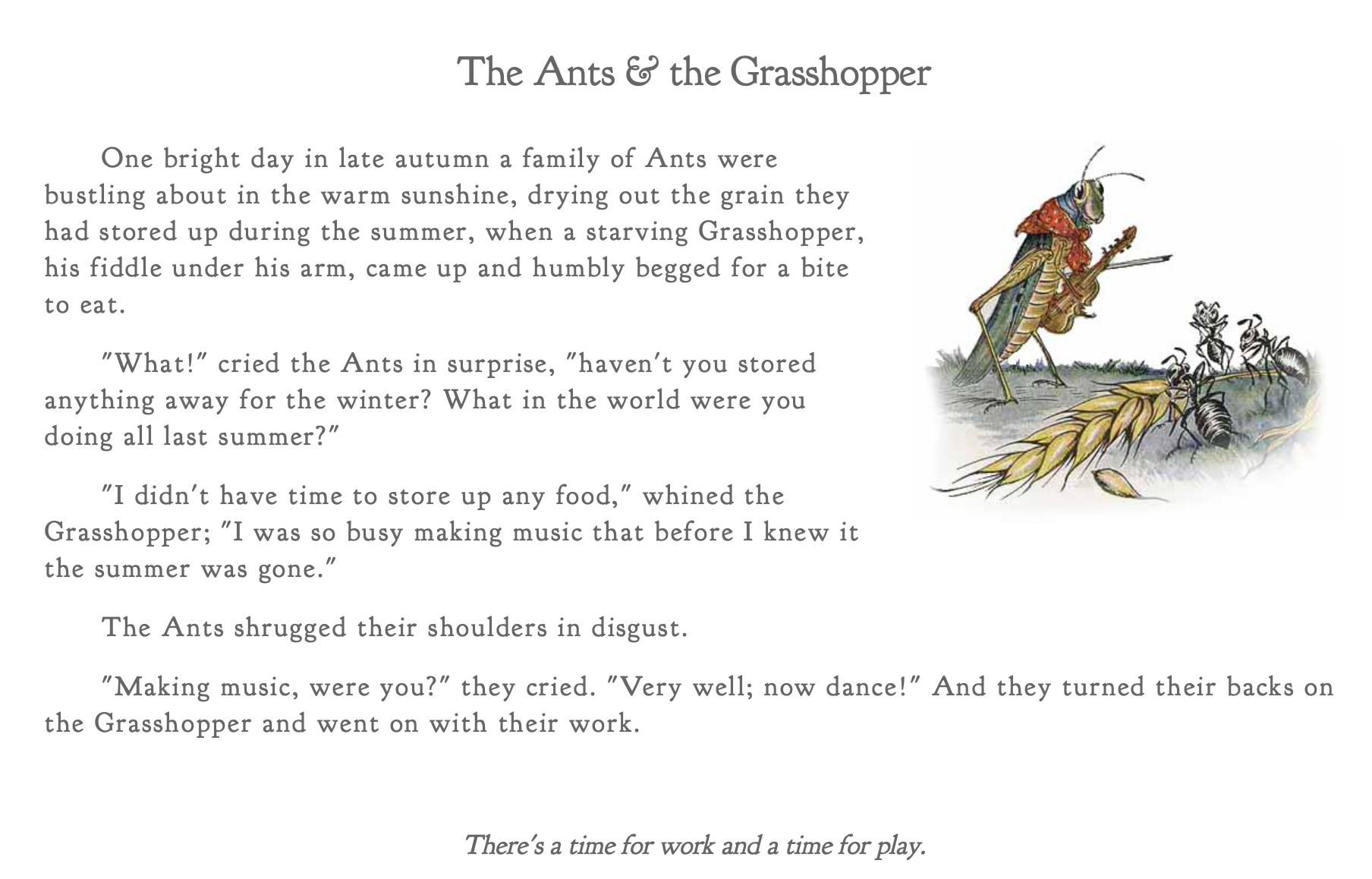Die With Zero
Die With Zero: Getting All You Can from Your Money and Your Life by Bill Perkins is an original thought-provoking book worth reading. Unlike other finance books I’ve recommended, it doesn’t help you maximize your net worth or improve your returns. It’s focused on maximizing life enjoyment and not missing things while saving for the future.
The book’s theme is turning the ant and grasshopper fable around to wonder when the ant gets to enjoy life.

Source: Library of Congress
It’s an occasionally jarring read for a wealth manager, but I’m getting ahead of myself. Perkins shares nine rules, which I’ll summarize before providing my thoughts.
The Nine Rules
Rule 1: Maximize your positive life experiences
People delay gratification for too long, or indefinitely and some things can only be enjoyed at younger ages. Think about the experiences you want to have and when you want to have them.
Rule 2: Start investing in experiences early
Ignore the world’s preprogramming for you and do the things identified from Rule One.
Rule 3: Aim to die with zero
Dying with money you can’t spend means you overworked and over-saved according to Perkins. Sure, you can give it to kids and charity but he argues effectively that they’d prefer it sooner and you’d enjoy seeing that happen.
Some of us save for potential massive health care costs late in life. Perkins fears you won’t be able to save enough for those treatments, so prioritize spending on your health earlier.
Rule No. 4: Use all available tools to help you die with zero
Use a life expectancy calculator to estimate longevity and a budget tool to determine your annual spend. This establishes what you’ll need and where excess savings begin.
Rule No. 5: Give money to your children or to charity when it has the most impact
The most common age for people to inherit is 60. As shared in Rule 3, don’t use children and charity to justify putting off life experiences and saving more. Give it to them earlier.
Rule No. 6: Don’t live your life on autopilot
Three main variables: health, free time, and money. Overdoing the money pursuit when younger is an issue since you can’t get those young and healthy years back. Later in life you should spend money to free up your time. “The older you are, the more someone should have to pay you to delay an experience.” Health is an all-ages focus.
Rule No. 7: Think of your life as distinct seasons
Have you ever gone on a vacation that was well planned so you didn’t miss seeing/doing all you could in a limited time? Plan your life like that vacation and build time buckets to ensure you do what you’d like during the ideal times in your life to have those experiences.
Rule No. 8: Know when to stop growing your wealth
Perkins recommends working with a professional to calculate how much money you’ll need in life. While getting to that number, spend on experiences that won’t prevent you from reaching it and once you have, increase spending so the nest egg doesn’t continue to grow.
Rule No. 9: Take your biggest risks when you have little to lose
My Thoughts
As I said, the book is a bit jarring, which Perkins admits. We work hard as wealth managers to make sure our clients don’t run out of money, and clients work hard to avoid financial insecurity. A book pushing us to spend early and often seems counter-intuitive.
However, Perkins is on to something.
Some people can’t afford the retirement they want and this book and post might seem like an infuriating waste of time. But many get their portfolio to a size that’ll fund a nice retirement and their saver mindset never shifts. Good savers don’t turn into good spenders, and their assets keep growing leaving their kids to inherit millions while they may have left a bucket list of things they wanted to do.
You should read the whole book for the details, and if it helps you enjoy life more without feeling like you’re taking too much risk, it’s a win.
Perkins himself said it best. His “real goal is pushing you in the right direction: By aiming to die with zero, you will forever change your autopilot focus from earning and saving and maximizing your wealth to living the best life you possibly can. That’s why dying with zero is a worthy goal—with this goal in mind, you are sure to get more out of your life than you otherwise would have.”
Looking for More Great Finance Reads?
Check Out These Top Picks
